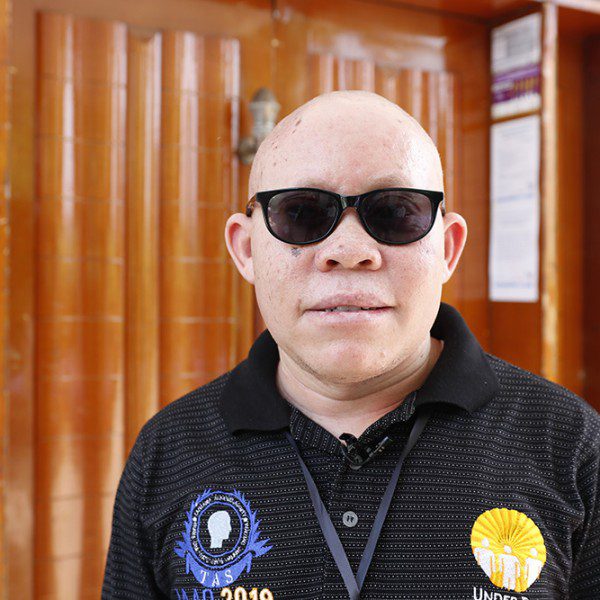

Discrimination against people with albinism in Tanzania and across Africa
The majority of people with albinism in Tanzania suffer from skin cancer because of a lack of melanin in their skin which automatically protects people from sun rays. There is also the lack of medication, lack of professionals, lack of dermatologists, and lack of sunscreen lotion in the country. Therefore, most of them are losing their lives because of that.
There is also the question of the attacks. Being attacked, being kidnapped, being amputated, being killed because of witchcraft. People believe that our skin, our body parts are a source of wealth. That if my body part is chopped off they will succeed, whether in fishing industries or in mining industries or the like. 1 in 8 people with albinism in all of the African continent have been killed from 2008 to 2017 have lost their lives because of witchcraft practices and believes. People believe that their body parts are sources of wealth and that they can become rich because of them. Therefore, most of our colleagues, our relatives, our friends, our partners have lost their lives because of that.
People believe that our skin, our body parts are a source of wealth…Most of our colleagues, our relatives, our friends, our partners have lost their lives because of that
If a person is attacked, killed, or kidnapped, they can come before a court of law and seek justice. However, because of lack of enough evidence, many times the cases are dismissed. Therefore the community and family misses their chance to seek justice for their relatives. Those are the main challenges that people with albinism all over the continent face.
Maintaining the independence of the African Commission on Human and Peoples Rights
In the case of human rights violations and human rights complaints, the commission has mandated power to receive complaints. The commission can receive cases and can issue statements or judgements as far as human rights violations in countries.
The challenge is that the commission has no power to enforce its decisions in a country
The commission is of course independent in one way or another, but the challenge is that the commission has no power to enforce its decisions in a country. In the case that there is a human rights violation, in State X or State Y, the commission has no enforcing mechanism to see that justice is obtained.
Who can contribute to protecting human rights in Africa?
On the subject of human rights protection, the first responsible party is states themselves. States have the obligation to respect, fulfill, protect, and promote human rights within their sovereignty. Second is international organizations. NGOS have the right to advocate, promote, protect, and respect human rights within their area of jurisdiction. Last there is UN agencies, including the security council and the likes.
States have the obligation to respect, fulfill, protect, and promote human rights
Last thing is international human rights institutions. We have the African Court of Justice, the African Criminal Code, the Sub-regional Court of Justice, ECOWAS; all these other actors of human rights in the regional and international arena in general.
My recommendation is that states should respect their own constitutions and their own laws on behalf of citizens. States are there to serve citizens. Most African countries are democratic countries, so governments are there because of the people, for the people, and by the people. Therefore, I recommend that states respect human rights institutions in the area of their sovereign jurisdictions.
The first responsibility of promoting human rights is vested in the states and not anyone else
Other actors, such as international organizations and UN agencies, are like watchdogs; they are watching in case there are violations and then they will make noises. But the first responsibility of promoting human rights is vested in the states and not anyone else.
